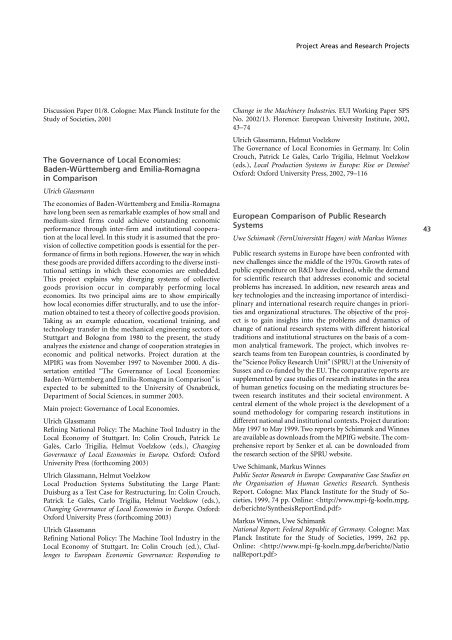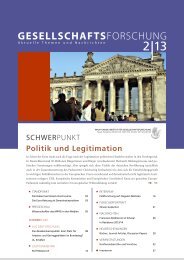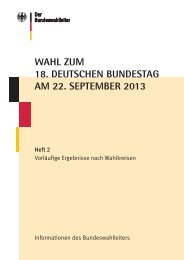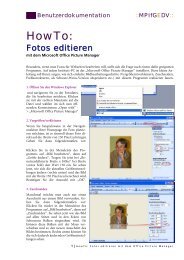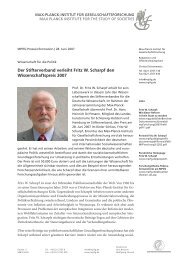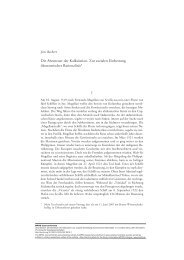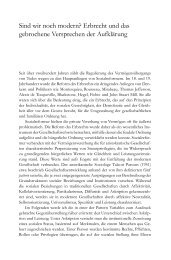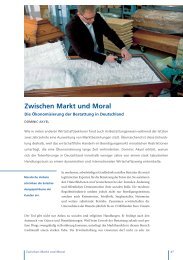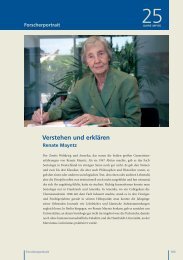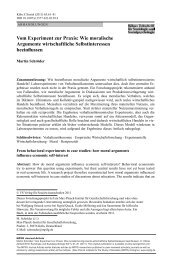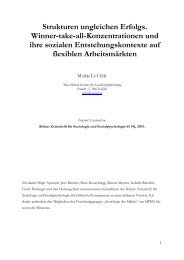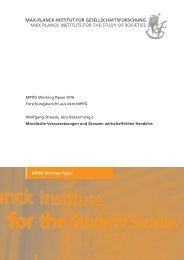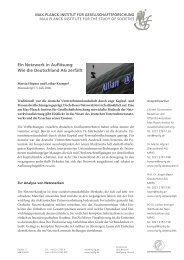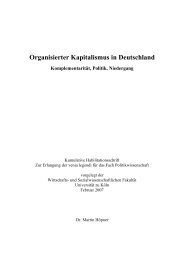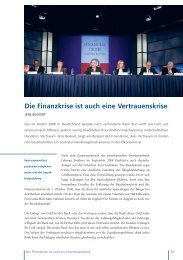Publications - MPIfG
Publications - MPIfG
Publications - MPIfG
You also want an ePaper? Increase the reach of your titles
YUMPU automatically turns print PDFs into web optimized ePapers that Google loves.
Discussion Paper 01/8. Cologne: Max Planck Institute for the<br />
Study of Societies, 2001<br />
The Governance of Local Economies:<br />
Baden-Württemberg and Emilia-Romagna<br />
in Comparison<br />
Ulrich Glassmann<br />
The economies of Baden-Württemberg and Emilia-Romagna<br />
have long been seen as remarkable examples of how small and<br />
medium-sized firms could achieve outstanding economic<br />
performance through inter-firm and institutional cooperation<br />
at the local level. In this study it is assumed that the provision<br />
of collective competition goods is essential for the performance<br />
of firms in both regions. However, the way in which<br />
these goods are provided differs according to the diverse institutional<br />
settings in which these economies are embedded.<br />
This project explains why diverging systems of collective<br />
goods provision occur in comparably performing local<br />
economies. Its two principal aims are to show empirically<br />
how local economies differ structurally, and to use the information<br />
obtained to test a theory of collective goods provision.<br />
Taking as an example education, vocational training, and<br />
technology transfer in the mechanical engineering sectors of<br />
Stuttgart and Bologna from 1980 to the present, the study<br />
analyzes the existence and change of cooperation strategies in<br />
economic and political networks. Project duration at the<br />
<strong>MPIfG</strong> was from November 1997 to November 2000. A dissertation<br />
entitled “The Governance of Local Economies:<br />
Baden-Württemberg and Emilia-Romagna in Comparison” is<br />
expected to be submitted to the University of Osnabrück,<br />
Department of Social Sciences, in summer 2003.<br />
Main project: Governance of Local Economies.<br />
Ulrich Glassmann<br />
Refining National Policy: The Machine Tool Industry in the<br />
Local Economy of Stuttgart. In: Colin Crouch, Patrick Le<br />
Galès, Carlo Trigilia, Helmut Voelzkow (eds.), Changing<br />
Governance of Local Economies in Europe. Oxford: Oxford<br />
University Press (forthcoming 2003)<br />
Ulrich Glassmann, Helmut Voelzkow<br />
Local Production Systems Substituting the Large Plant:<br />
Duisburg as a Test Case for Restructuring. In: Colin Crouch,<br />
Patrick Le Galès, Carlo Trigilia, Helmut Voelzkow (eds.),<br />
Changing Governance of Local Economies in Europe. Oxford:<br />
Oxford University Press (forthcoming 2003)<br />
Ulrich Glassmann<br />
Refining National Policy: The Machine Tool Industry in the<br />
Local Economy of Stuttgart. In: Colin Crouch (ed.), Challenges<br />
to European Economic Governance: Responding to<br />
Project Areas and Research Projects<br />
Change in the Machinery Industries. EUI Working Paper SPS<br />
No. 2002/13. Florence: European University Institute, 2002,<br />
43–74<br />
Ulrich Glassmann, Helmut Voelzkow<br />
The Governance of Local Economies in Germany. In: Colin<br />
Crouch, Patrick Le Galès, Carlo Trigilia, Helmut Voelzkow<br />
(eds.), Local Production Systems in Europe: Rise or Demise?<br />
Oxford: Oxford University Press, 2002, 79–116<br />
European Comparison of Public Research<br />
Systems<br />
Uwe Schimank (FernUniversität Hagen) with Markus Winnes<br />
Public research systems in Europe have been confronted with<br />
new challenges since the middle of the 1970s. Growth rates of<br />
public expenditure on R&D have declined, while the demand<br />
for scientific research that addresses economic and societal<br />
problems has increased. In addition, new research areas and<br />
key technologies and the increasing importance of interdisciplinary<br />
and international research require changes in priorities<br />
and organizational structures. The objective of the project<br />
is to gain insights into the problems and dynamics of<br />
change of national research systems with different historical<br />
traditions and institutional structures on the basis of a common<br />
analytical framework. The project, which involves research<br />
teams from ten European countries, is coordinated by<br />
the “Science Policy Research Unit” (SPRU) at the University of<br />
Sussex and co-funded by the EU. The comparative reports are<br />
supplemented by case studies of research institutes in the area<br />
of human genetics focusing on the mediating structures between<br />
research institutes and their societal environment. A<br />
central element of the whole project is the development of a<br />
sound methodology for comparing research institutions in<br />
different national and institutional contexts. Project duration:<br />
May 1997 to May 1999. Two reports by Schimank and Winnes<br />
are available as downloads from the <strong>MPIfG</strong> website. The comprehensive<br />
report by Senker et al. can be downloaded from<br />
the research section of the SPRU website.<br />
Uwe Schimank, Markus Winnes<br />
Public Sector Research in Europe: Comparative Case Studies on<br />
the Organisation of Human Genetics Research. Synthesis<br />
Report. Cologne: Max Planck Institute for the Study of Societies,<br />
1999, 74 pp. Online: <br />
Markus Winnes, Uwe Schimank<br />
National Report: Federal Republic of Germany. Cologne: Max<br />
Planck Institute for the Study of Societies, 1999, 262 pp.<br />
Online: <br />
43


